Don't wanna be here? Send us removal request.
Text
Mastering Soft Skills: The Key to PMP Success and Effective Project Management
Introduction
Regarding Project Management Professional (PMP) certification, they focus on the technical aspects and the vast knowledge required to pass the exam. However, an important but often overlooked aspect of PMP success is the role of soft skills. These interpersonal and interpersonal skills are critical to effective project management and can significantly affect a manager’s ability to lead, negotiate, and resolve conflict In this blog, we will explore the importance of soft knowledge is important in PMP success and how it complements project management technical skills.
What Are Soft Skills?
Soft skills, also known as interpersonal or people skills, include non-technical abilities related to how you communicate with others, manage your emotions, and do your job These skills include:
Communication: The ability to convey information clearly and effectively.
Leadership: Responsible for motivating and guiding teams to achieve project goals.
Negotiation: To find mutually beneficial solutions in dialogue with stakeholders.
Conflict Resolution: Managing and resolving conflict constructively.
Adaptability: Flexibility and openness to change.
Time Management: Managing time efficiently to meet deadlines.
Emotional intelligence: Understanding and managing your own and others’ emotions.
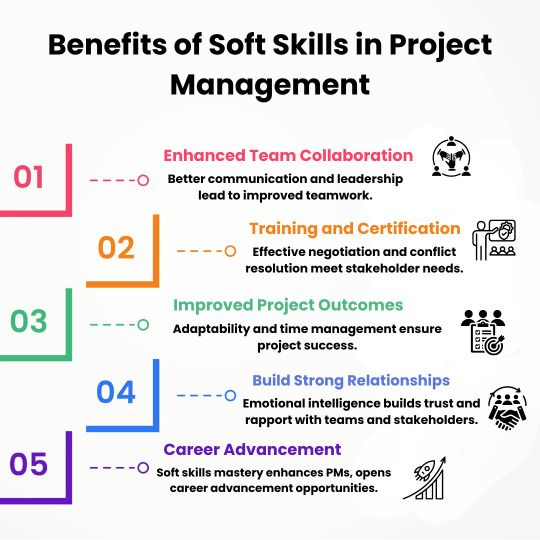
The Importance of Soft Skills in Project Management
Effective Communication
One of the most important soft skills for project managers is effective communication. Clear and concise communication is essential whether it’s providing project updates to stakeholders, facilitating team meetings, or writing reports. Poor communication can lead to misunderstandings, missed deadlines, and project failure. As a PMP-certified project manager, clearly articulating ideas and guidelines helps keep everyone on the same page and working toward the same goals.
Leadership
Leadership goes beyond managing projects and programs; it involves motivating your team to perform better. Effective leaders create a vision, set clear goals, and provide the support and resources the team needs to succeed. Leadership seeks to identify and address team dynamics, foster a positive work environment, and lead by example. PMP professionals who excel in leadership can help their teams achieve outstanding results even in the face of challenges.
Negotiation and Conflict Resolution
Projects often involve different groups of stakeholders, each with their own interests and priorities. Negotiation skills are needed to balance these interests and negotiate agreements that satisfy all parties. Similarly, conflict management skills are needed to prevent and resolve potential conflicts within the team or with external stakeholders. A project manager who can effectively manage communication and conflict can maintain cohesion and keep the project on track.
Adaptability
In a world of fast-paced business models, change is inevitable. Whether it’s changes in project scope, unexpected risks, and stakeholder needs, flexibility is key to successfully managing these changes PMP professionals who are flexible will be able to quickly adjust their processes and refine their processes to keep pace with new developments, ensuring that the business continues to meet its objectives.
Time Management
Effective time management is essential to ensure that tasks are completed properly and to meet project deadlines. This includes prioritizing tasks, setting appropriate timelines, and avoiding delays. Good time management helps project managers allocate resources efficiently and eliminate bottlenecks that can delay a project.
Emotional Intelligence
Emotional intelligence (EI) is the ability to understand and manage one’s and others’ emotions. Higher EI is associated with better teamwork, improved communication, and stronger relationships. For PMP professionals, emotional intelligence is critical to managing complex human interactions in a project. It enables managers to empathize with team members, manage stress, and make appropriate decisions considering the emotional impact on the team.
Conclusion
The role of soft skills in PMP Certification success cannot be overstated. While technical skills and knowledge are key, the ability to effectively communicate, lead, negotiate, adapt, manage time, and take an emotional approach is what truly sets project managers apart By developing and integrating these soft skills, PMPs can increase their overall effectiveness, improve project success, achieve their business goals. Remember that project management skills are not just knowing the process but understanding and managing the people involved.
#PMP#CommunicationSkills#LeadershipSkills#NegotiationSkills#ConflictResolution#Adaptability#ProjectManagement
0 notes
Text
Networking and Community for PfMP Professionals: Building Connections for Career Growth
Introduction
In the dynamic world of portfolio management, having strong professional networks and being part of a vibrant community can greatly enhance your career prospects. Networking and community involvement are invaluable for individuals with a PfMP (Portfolio Management Professional) certification to stay abreast of industry developments, share knowledge, and explore new opportunities. This blog explores the importance of networking for PfMP professionals and offers practical tips on successfully building your professional networks.
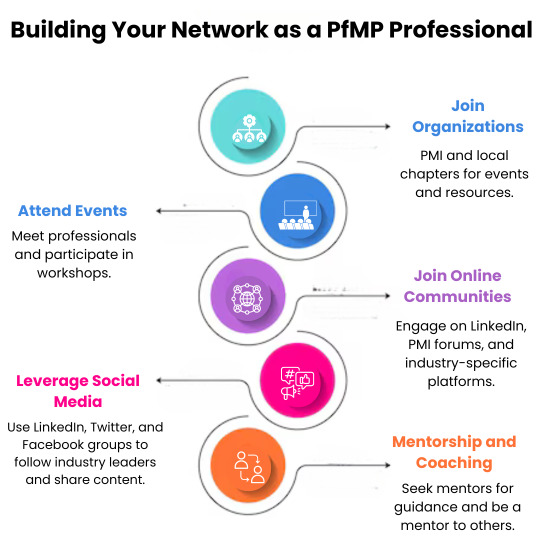
Why Networking Matters for PfMP Professionals
1. Knowledge Sharing and Learning
Networking allows you to connect with other professionals with different experiences and insights. Networking with your peers can help you learn new techniques, tools, and best practices in portfolio management. It’s a great way to keep up with industry trends and improve your skills.
2. Career Advancement
Many job opportunities are never publicly advertised; They are supported through professional relationships. Actively communicating increases your chances of hearing about job openings and being recommended. Additionally, mentors and peers can provide career development guidance and help guide you along your career path.
3. Support and Collaboration
Being part of the professional community provides a support system. Whether you need advice on complex portfolio management or collaborate on a project, your network can be a valuable resource. Communities also provide forums to discuss challenges and solutions, creating a collaborative environment for collaboration.
4. Credibility and Visibility
Being actively involved in the industry can build credibility and visibility. Speaking at conferences, writing articles, or contributing to discussions can establish you as a thought leader and open doors to new opportunities.
Building Your Network
1. Join Professional Organizations
Organizations like the Project Management Institute (PMI) offer many networking opportunities through local chapters, special interest groups, and online forums. Participating in these organizations gives you access to various events and resources from a great professional community.
2. Attend Conferences and Events
Professional conferences and workshops are great places to meet new portfolio management professionals. These sessions provide an opportunity to learn from experts, participate in discussions, and network with peers.
3. Participate in Online Communities
Online platforms like LinkedIn, PMI’s online community, and other industry-specific platforms are great for networking. Engage in conversation, share your knowledge, and network with other professionals. Joining the right LinkedIn groups and conversing can help you build a strong online presence.
4. Leverage Social Media
Use social media platforms to connect with other professionals, follow industry leaders, and stay up-to-date with the latest news and information. Professional Twitter, LinkedIn, and Facebook groups can be useful for networking and sharing knowledge.
5. Mentorship and Coaching
Look for mentors who can offer guidance and support in your career journey. Similarly, consider teaching others; it’s a rewarding way to give back to the community and can help you learn and grow professionally.
Conclusion
Networking and community engagement are essential for PfMP certification aiming to grow their careers and remain at the forefront of the portfolio management field. By building strong professional networks and actively participating in the community, you can gain valuable insights, identify new opportunities, and contribute to the growth of the portfolio management profession. Start networking today and watch your business reach new heights!
0 notes
Text
Maintaining Your PfMP Certification: PDUs and Continuing Education
Introduction
Earning Portfolio Management Professional (PfMP) certification is an important part of a portfolio manager’s career. However, maintaining this prestigious certification requires ongoing professional development and compliance with PMI’s Continuing Certification Requirements (CCR) program. This blog will walk you through maintaining your PfMP certification by earning Professional Development Units (PDUs) and continuing education.
Understanding PDUs and CCR
PMI’s Continuing Certification Requirements (CCR) program ensures that certified professionals remain relevant in an ever-growing industry. For PfMP-certified holders, this requires 60 PDUs every three years. PDU number of approved educational and professional service activities.

Categories of PDUs
PDUs are divided into two main categories:
1. Education PDUs
The Education PDU is designed to ensure you are the latest trends and best practices in portfolio management. These are also divided into three subcategories:
Technical Project Management
Leadership
Strategic and Business Management
Technical Project Management:
Focuses on the skills needed to manage projects and departments.
Activities may include attendance at webinars and workshops, or online courses on project management tools, techniques, and techniques.
Leadership:
The goal is to improve your ability to lead and motivate teams.
Leadership training includes attending seminars on team management and learning effective communication techniques.
Strategic and Business Management:
Concentrates on the knowledge required to align your portfolio with business objectives.
Activities can involve attending business strategy seminars, studying economic trends, or taking courses on business analytics.
2. Giving Back PDUs
Giving Back PDUs focus on sharing your knowledge and skills with others. This category is divided into three sub-categories:
Volunteering
Creating Knowledge
Working as a Professional
Volunteering:
Involve offering your time and skills to help others in the project management community.
Activities may include serving as a mentor, participating in PMI chapter activities, or volunteering for nonprofit organizations.
Creating Knowledge:
This entails contributing to the body of knowledge in portfolio management.
This includes writing articles, blogging about portfolio management, presenting at conferences, and developing educational content.
Working as a Professional:
Recognizes the work you do in your professional role.
Simply performing your job as a portfolio manager can earn you PDUs, as it involves applying the knowledge and skills you have gained.
Earning PDUs: Practical Tips
Attend PMI Events: PMI Global Conference, regional conferences, and local chapter meetings are excellent opportunities to earn PDUs and network with other professionals.
Online Courses and Webinars: Many online platforms offer courses that qualify for PDUs. PMI’s e-learning platform and third-party providers like Coursera and LinkedIn Learning offer a range of relevant courses.
Read and Study: Reading books, articles, and white papers on portfolio management, leadership, and strategic business management can earn you PDUs.
Volunteer for PMI: Engage in PMI chapter activities or offer your expertise to help PMI initiatives. This not only helps you to earn PDUs but also strengthens your professional network.
Share Your Knowledge: Write articles, and blog posts, or create videos on portfolio management topics. Present at webinars, conferences, or local PMI chapter meetings.
Recording and Reporting PDUs
To maintain your PfMP certification, you must report your PDUs to PMI. Here’s how:
Log into the PMI CCRS:
Use the Continuing Certification Requirements System (CCRS) on the PMI website.
Report PDUs:
Enter the details of your activities and the number of PDUs earned. Ensure you keep proof of attendance or participation, as PMI may audit your claims.
Monitor Your Progress:
Regularly check your PDU balance to ensure you are on track to meet the 60 PDU requirement within your three-year cycle.
Conclusion
Maintaining your PfMP certification is a continuous journey of learning and professional growth. By actively engaging in educational activities and giving back to the profession, you fulfill PMI’s requirements and enhance your skills and knowledge. Stay proactive in seeking opportunities to earn PDUs, and leverage the resources available to PMI and other professional organizations
0 notes
Text
Future of Risk Management in Project Management
Introduction
Risk management is always an important aspect of project management, ensuring that potential challenges are identified, assessed, and mitigated before they can compromise project objectives. As we look to the future, the risk management landscape is rapidly evolving, driven by technological advances, changing business environments, and new approaches In this blog we will explore the key trends and innovations shaping the future of RMP Course.
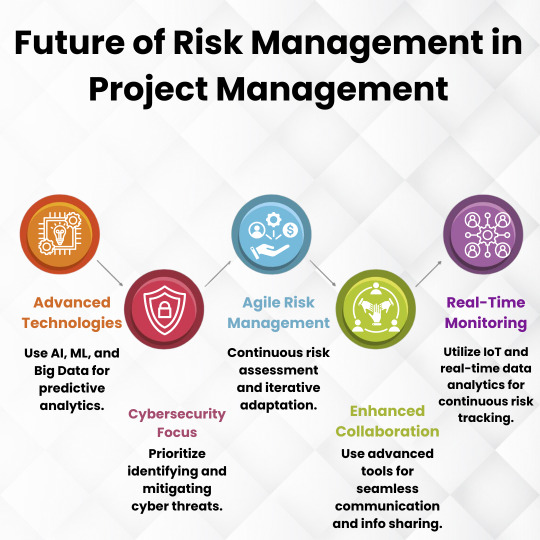
1. Integration of Advanced Technologies
One of the most important changes in risk management is the integration of advanced technologies. Artificial intelligence (AI), machine learning (ML), and big data analytics are changing project managers' identification and evaluation of risks. This technology enables predictive analytics, which can predict potential risks based on historical and current data. For example, AI algorithms can analyze vast amounts of project data delays, budget overruns, and other risks, allowing project managers to take proactive actions.
2. Real-Time Risk Monitoring and Management
The future of risk management sees a shift from continuous risk assessment to dynamic, real-time risk management. Internet of Things (IoT) devices and real-time data analytics enable project managers to monitor project data continuously. This real-time approach enables immediate detection and response to emerging risks, significantly reducing the potential impact on project results.
3. Agile Risk Management
The future of risk management sees a shift from continuous risk assessment to dynamic, real-time risk management. Internet of Things (IoT) devices and real-time data analytics enable project managers to monitor project data continuously. This real-time approach enables immediate detection and response to emerging risks, significantly reducing the potential impact on project results.
4. Increased Focus on Cybersecurity Risks
With increasing reliance on digital tools and online platforms, cybersecurity has become a key component of risk management. Future risk management strategies should prioritize identifying and mitigating cybersecurity threats to protect critical business data and ensure the integrity of digital systems.
5. Enhanced Collaboration and Communication Tools
Effective risk management depends on collaboration and easy communication among project stakeholders. The future will see a proliferation of advanced collaboration tools that facilitate better communication, information sharing, and decision-making. These tools can help align departments, ensure transparency, and enable collaborative risk management efforts.
6. Sustainability and Resilience in Risk Management
As growth and resilience have become central themes in business strategy, risk management has also evolved to incorporate these concepts. Project managers consider environmental, social, and governance (ESG) risks to ensure that projects contribute effectively to sustainable development goals and are environmentally and socially sustainable the mouth of violence.
7. Emphasis on Human Factors and Behavioral Risks
Understanding human behavior and its impact on risk is important in risk management. Future risk management strategies should address behavioral risks, such as decision bias, team dynamics, and stakeholder engagement. Training and development programs will be essential in developing a workforce with the skills to identify and manage these human factors effectively.
Conclusion
Future risk management in RMP Certification emphasizes technological innovation, real-time analytics, agility, cybersecurity, sustainable development, and human factors By embracing these advancements and continuously transforming their risk management practices, project managers can effectively navigate today’s complex projects and inspire successful results. Moving forward, the integration of these advanced risk management strategies will be essential to ensure businesses are resilient, sustainable, and successful in an ever-changing business environment.
#RiskManagement#ProjectManagement#FutureOfWork#AdvancedTechnologies#RealTimeMonitoring#AgileMethodologies
0 notes
Text
Role of PMP Certification in Different Industries
Introduction
The Project Management Certification administered by the Project Management Institute (PMI) is recognized worldwide as a model of excellence in project management Although the basic principles of project management remain equally across industries the application of these principles can vary greatly from industry to industry and emphasize its role in development.
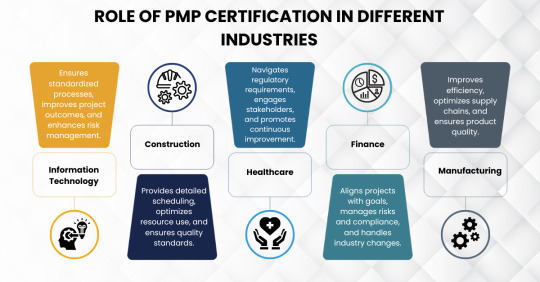
1. Information Technology (IT)
Key Benefits:
Process standards: PMP certification provides IT professionals with standardized project management practices, ensuring service accuracy and quality.
Improving program outcomes: A systematic planning, implementation, and evaluation enables PMP-certified managers to deliver IT services on time and within budget.
Risk management: The IT industry is susceptible to technological changes and risks. PMP-certified managers are adept at identifying, assessing, and effectively mitigating risks.
2. Construction
Key Benefits:
Enhanced scheduling and scheduling: Construction projects often have complex timelines and dependencies. PMP certification provides the skills to implement realistic and comprehensive business plans.
Materials Management: Building and using efficient materials is important in construction. PMP certification helps managers optimize resource utilization, and reduce waste and costs.
Quality: Ensuring that construction projects meet quality standards and regulatory requirements is essential. PMP-certified personnel are proficient in quality control procedures.
3. Healthcare
Key Benefits:
Compliance: The healthcare industry is highly regulated. PMP certification helps project managers meet stringent regulatory requirements and ensure compliance.
Stakeholder management: Healthcare often involves a variety of stakeholders, including physicians, patients, and regulatory bodies. PMP-certified managers excel in stakeholder engagement and communication.
Process Improvement: PMP certification encourages continuous process improvement, increasing patient care and surgical efficiency.
4. Finance
Key Benefits:
Plan Implementation: A certified financial professional with which the PMP can align projects with organizational objectives, ensuring that strategic plans are properly executed.
Risk and Compliance Management: Financial services often have significant risks and regulatory requirements. PMP certification provides the tools to manage this aspect effectively.
Management of change: The financial industry is frequently subject to change due to market fluctuations and regulatory changes. PMP-certified managers are adept at managing change and ensuring that change happens effectively.
5. Manufacturing
Key Benefits:
Process efficiencies: PMP certification teaches process efficiencies, which are critical for projects to improve efficiency and reduce costs
Supply Chain Management: Effective supply chain management is critical in manufacturing. PMP-certified professionals are skilled in organizing and optimizing supply chain activities.
Quality Control: Maintaining high standards is important in manufacturing. PMP certification includes quality principles that help ensure products meet specifications and standards.
Conclusion
PMP certification is a valuable industry asset, providing customized business processes that increase project success rates. Whether in information technology, construction, healthcare, finance, or manufacturing, professionals with PMP certification bring a wealth of knowledge and skills that lead to the successful completion of projects. As the industry continues to evolve, the demand for experienced managers will only increase, making PMP certification an important step for those looking to advance their careers in project management.
#PMPCertification#ProjectManagement#IndustryImpact#IT#Healthcare#Construction#Finance#ProfessionalDevelopment#CareerAdvancement
0 notes
Text
Top Benefits of PRINCE2 Certification for Project Managers
Introduction
Employees constantly seek ways to upgrade their skills and credentials in the active management phase. One notable certification is PRINCE2 (Projects IN Controlled Environments). Globally recognized, PRINCE2 delivers a structured approach to project management, ensuring that projects are managed effectively and efficiently. Here we explore the top benefits of obtaining PRINCE2 certification for project managers.
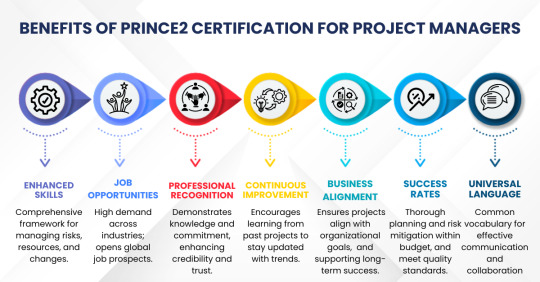
1. Enhanced Project Management Skills
PRINCE2 provides a comprehensive framework for all aspects of project management, from inception to completion. By following this process, project managers can ensure that every aspect of the project is properly organized and controlled. Certification provides employees with skills to manage risk, control resources and manage workplace change effectively, leading to successful project outcomes.
2. Increased Job Opportunities
The demand for PRINCE2-certified professionals in various industries is increasing. Organizations value the structured approach and best practices that PRINCE2-certified managers bring. This certification is recognized worldwide and opens many career opportunities in both the public and private sectors. Whether you are to advance within your current organization or pursue new opportunities, PRINCE2 certification can increase your business potential.
3. Improved Project Success Rates
PRINCE2 emphasizes good planning, which is critical to success. Ensures projects have clearly defined goals, roles, and responsibilities. By following the PRINCE2 methodology, project managers can anticipate potential challenges and mitigate risks before they become an issue. This strategic approach enhances success, as projects are completed on time, within budget, and with the best possible quality.
4. Universal Language of Project Management
The main advantage of PRINCE2 is that it provides a common vocabulary for project management. This universal language facilitates communication between stakeholders, team members, and customers. This ensures everyone is on the same page, reduces misunderstandings, and increases cohesion. This joint process is useful for projects involving multilateral organizations or groups.
5. Scalability and Flexibility
PRINCE2 is a simple and intuitive methodology, suitable for projects of any size and complexity. It can be tailored to the specific needs of a project, allowing project managers to adapt the principles and techniques to the project context This flexibility makes PRINCE2 a valuable tool for evaluating a wide range of projects, from small projects to large-scale endeavors.
6. Professional Recognition and Credibility
Earning a PRINCE2 certification is proof of a manager’s knowledge, skills, and commitment to professional development. Demonstrates a thorough understanding of a structured project management approach, and builds employee conviction. Employers and clients typically view employees with PRINCE2 certification as more efficient and reliable, increasing their trust and confidence in their project management capabilities.
7. Continuous Improvement and Learning
PRINCE2 promotes a culture of continuous improvement. The methodology includes lessons learned as a key element, ensuring that project managers and teams reflect on prior projects to identify areas for improvement. This focus on continuous learning helps employees keep their skills up-to-date and adapt to evolving project management trends and challenges.
Conclusion
PRINCE2 certification provides project managers with several benefits, from enhanced skills and improved career opportunities to increased project success rates and employee recognition. Its structured, flexible, and adaptive approach suits various projects and ensures efficient and effective management. PRINCE2 certification is a valuable resource for managers looking to advance their careers and contribute to the success of their organizations.
#ProjectManagement#PRINCE2#Certification#CareerDevelopment#ProfessionalGrowth#ProjectSuccess#ManagementSkills#JobOpportunities
0 notes
Text
Why PRINCE2 Practitioner Certification is Essential for Project Managers
Introduction
Effective project management is essential to achieving organizational objectives and delivering value in today’s dynamic business environment. Among the countless project management options available, PRINCE2 (Projects IN Controlled Environments) stands out as a globally recognized and widely recognized program Achieving PRINCE2 Practitioner certification is a critical milestone for business managers aiming to enhance their skills and career prospects. Here’s why this certification is important for project managers.
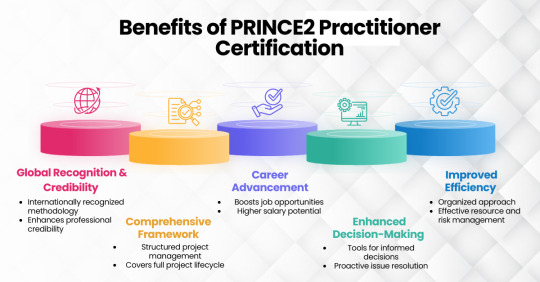
1. Global Recognition and Credibility
PRINCE2 Certification Course is an internationally recognized business model, endorsed by organizations. By achieving the PRINCE2 Practitioner certification, project managers demonstrate their commitment to best practice and their ability to apply a systematic approach to project management. These certifications mark professionalism and reliability certified professionals more attractive to employers and clients.
2. Comprehensive Framework for Project Management
PRINCE2 provides a comprehensive and scalable framework for all aspects of project management. It outlines clear processes, principles, and themes that guide project managers throughout the project life cycle, from inception to completion. This comprehensive approach ensures that all critical elements of project management are addressed, resulting in predictable project outcomes.
3. Enhanced Decision-Making and Problem-Solving Skills
The PRINCE2 Practitioner certification gives project managers the tools and techniques to make informed decisions and effectively solve problems. The approach always emphasizes business logic, defined roles, responsibilities, and deliverables. These principles enable project managers to proactively identify and address issues, ensuring project continuity and profitability.
4. Improved Project Efficiency and Control
PRINCE2 promotes a controlled and structured approach to project management, including planning, analyzing, and managing project activities Certified professionals learn how to break tasks down into executable parts address for resource efficiency, risk management, and quality control. This structured approach improves project efficiency, reduces risk, and provides quality deliverables.
5. Adaptability to Various Project Types and Environments
One of the key strengths of PRINCE2 is its flexibility. The methodology can be tailored to different project sizes, complexities, and environments. Whether managing a small domestic project or a large international program, PRINCE2 provides flexibility in approach to meet specific needs This flexibility makes PRINCE2 relevant to projects and projects of all types, increasing its value to project managers.
6. Career Advancement and Salary Prospects
Holding the PRINCE2 Practitioner certification can significantly enhance a manager’s career prospects. Employers generally prefer certified professionals for their proven skills and ability to deliver successful services. Additionally, the PRINCE2 certification is associated with higher salary potential. According to industry studies, managers with PRINCE2 certification earn more than their non-certified counterparts.
7. Access to a Global Community of Professionals
Becoming a PRINCE2 Practitioner means joining a global network of business professionals. These communities provide opportunities for networking, knowledge sharing, and professional development. Interacting with other PRINCE2 professionals allows for best practices, insights, and experiences, further enhancing one’s knowledge and expertise.
Conclusion
At a time when effective project management is essential to organizational success, the PRINCE2 Practitioner certification provides a strong framework for managers to excel in their roles. Its global recognition, comprehensive approach, and flexibility make it a valuable asset for professionals looking to grow their careers. By becoming a PRINCE2 Practitioner, managers enhance their skills and confidence and contribute to projects that add business value.
0 notes
Text
Path to PfMP Certification: Your Guide to Mastering Portfolio Management
Introduction
In today’s fast-paced business environment, organizations require careful portfolio management to ensure that their projects and programs align with established goals with the Portfolio Management Professional certification by the Project Management Institute ( 2010 ). PMI) offers a prestigious certification for professionals who must recognize their expertise in this important area. This blog will walk you through obtaining your PfMP certification, from understanding the eligibility requirements to acing the exam.
Understanding PfMP Certification
The PfMP certification is designed for experienced portfolio managers who manage projects and programs to achieve strategic goals. This certification demonstrates the ability to manage and align portfolios with your organization’s objectives, ensuring that resources are allocated efficiently and effectively.
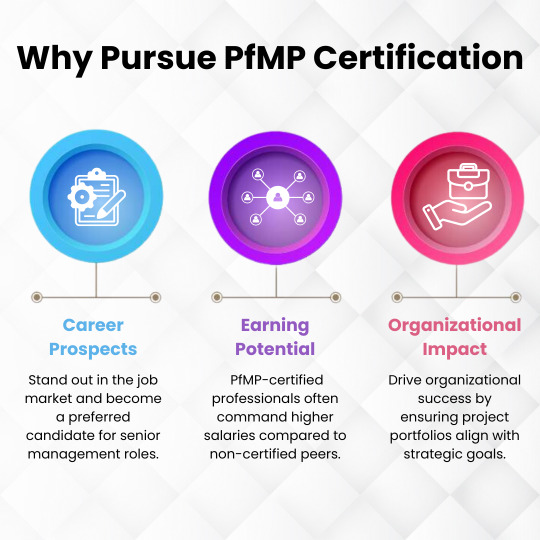
Why Pursue PfMP Certification?
Improved career prospects: PfMP certification sets you apart in the industry, making you a candidate for executive roles.
Improved income: Certified fund managers generally command higher salaries than their non-certified counterparts.
Organizational Impact: PfMP certification provides the skills to drive organizational success by ensuring alignment with strategic objectives.
Eligibility Criteria
Before embarking on your PfMP certification journey, it is important to ensure you meet the eligibility criteria set by PMI. These include:
Educational Qualifications: Secondary degree (high school diploma, associate degree, or world-class degree) or four-year degree (bachelor’s degree or world-class equivalent).
Portfolio Management Experience: Holders of a high school degree need a minimum of seven years (10,500 hours) of experience in portfolio management. A four-year degree requires four years (6,000 hours) of experience.
Professional Experience: All candidates have eight years (96 months) of professional experience.
Preparing for the PfMP Exam
Once your application has been approved, it’s time to prepare for the PfMP exam. Here are some tips and tricks to help you succeed.
Understand the exam format: The PfMP exam has 170 multiple-choice questions, and you have four hours to complete it. The questions cover five areas: strategic planning, governance, banking, banking risk management, and communication strategy.
Learning Resources: Use PMI’s PfMP Exam Content outline and standards for portfolio Management. Consider investing in study guides, online courses, and practice tests.
Join Study Groups: Interacting with other PfMP candidates can provide valuable insights and enhance your understanding of complex issues.
Practice tests: A practice test gives you a good idea of how and when the test is conducted.
Maintaining Your PfMP Certification
Maintaining your certification by passing the exam and obtaining the PfMP certification is important. This requires 60 Professional Development Units (PDUs) every three years. PDUs can be earned through professional development activities such as webinars, classes, and PMI conferences.
Conclusion
Achieving PfMP certification is an important part of your portfolio management career. It takes dedication, thorough preparation, and strategy. By following this guide you will be well on your way to joining a team of portfolio management professionals recognized for their expertise and ability to drive organizational success Start your PfMP journey today and take your career to new heights!
#PfMPCertification#PortfolioManagement#CareerGrowth#ProfessionalDevelopment#ProjectManagement#PMICertification#StrategicAlignment#EarningPotential
1 note
·
View note
Text
Maximizing Productivity: Embracing Lean Six Sigma Black Belt Principles in Daily Work
Introduction
In today’s competitive business environment, organizations constantly strive to improve efficiency, reduce waste, and increase quality. Lean Six Sigma techniques, especially the principles associated with Black Belt certification, provide a powerful framework for achieving these goals. However, large enterprises not only use Lean Six Sigma principles but can also be incorporated into the daily work routine to stimulate continuous improvement at the individual level. This blog explores practical ways individuals can incorporate Lean Six Sigma Black Belt principles into their daily work and personal development.
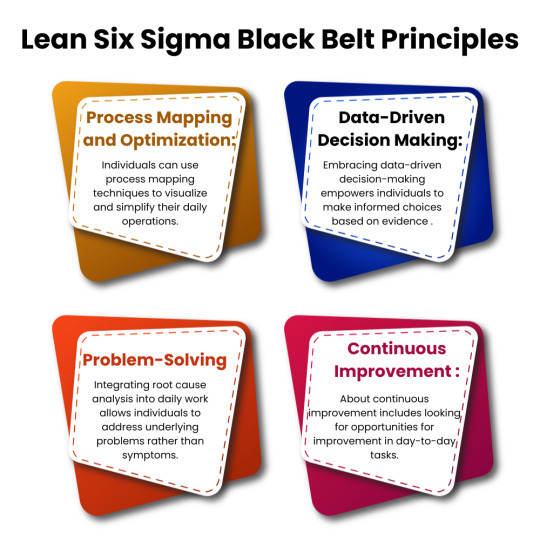
Understanding Lean Six Sigma Black Belt Principles
The Lean Six Sigma Black Belt Certification provides professionals with in-depth knowledge of process improvement techniques, statistical analysis, project management, and leadership skills. These principles are designed to identify and eliminate defects, reduce variability, and improve overall efficiency. Although commonly applied in organizational projects, these principles can be tailored to individual roles and responsibilities, fostering a culture of continuous improvement at the micro level.
Practical Application in Daily Work
1.Process Mapping and Optimization: Individuals can use process mapping techniques to visualize and simplify their daily operations. Identifying useful activities and simplifying processes can lead to significant time savings and productivity gains.
2.Data-Driven Decision Making: Embracing data-driven decision-making empowers individuals to make informed choices based on evidence rather than emotion. This may include monitoring key performance metrics, analyzing trends, and using data to drive improvements in day-to-day operations.
3.Problem-Solving and Root Cause Analysis:Integrating root cause analysis into daily work allows individuals to address underlying problems rather than symptoms. This approach fosters a culture of prompt problem solving and prevents recurring issues.
4. Continuous Improvement Mindset: Thinking about continuous improvement includes looking for opportunities for improvement in day-to-day tasks, seeking feedback, and participating in efforts to improve processes in the strong.
Personal Development Through Lean Six Sigma Principles
In addition to enhancing day-to-day business processes, adopting Lean Six Sigma Black Belt Certification can contribute to personal and professional growth. Developing skills such as project management, data analytics, and change management can significantly increase an individual’s value within an organization and in the job market.
Conclusion
Integrating Lean Six Sigma Black Belt principles into everyday work is not solely the responsibility of the employees or the project team; It is a perspective that can be embraced by individuals at all levels of the organization. By applying the core principles of Lean Six Sigma to everyday projects and personal development, individuals can contribute to a culture of continuous improvement, inspire efficiency and enhance their productivity. Ultimately, incorporating Lean Six Sigma Black Belt principles into daily work not only benefits the individual but also contributes to the success of the organization as a whole.
0 notes
Text
Mastering the PgMP Exam Content Outline: Your Guide to Success
Introduction
Earning Program Management Professional (PgMP)® certification is a key milestone for any program manager. The Project Management Institute (PMI) offers the PgMP certificate for professionals managing complex projects to achieve strategic business goals. The PgMP Test Case Study is a key component of PgMP certification, which provides a comprehensive framework of the knowledge and skills required for effective program management. This blog will explore the key elements of the PgMP Exam Outline and provide tips for optimizing each area.
Understanding the PgMP Exam Content Outline
The PgMP Test Data System is divided into five work areas, each representing an important area of system management. These domains are:
Strategic Program Management
Program Life Cycle
Benefits Management
Stakeholder Management
Governance
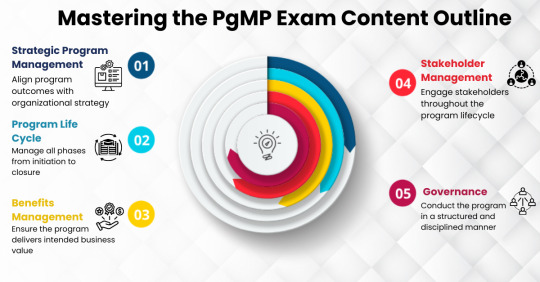
1. Strategic Program Management
Overview
Strategic planning focuses on aligning program outcomes with organizational strategy. This area emphasizes strategic objectives, identifying benefits, and staying consistent throughout the life of the program.
Key Tasks
Start by defining the program.
Create a system management plan.
Ensure consistency with organizational policy.
Monitor and monitor program progress.
Tips for Success
Develop a deep understanding of your organization’s strategic goals.
Use it to create a complete system management plan.
Keep abreast of industry trends and how they affect strategic objectives.
2. Program Life Cycle
Overview
The project life cycle area covers the stages from project initiation to completion. Ensures that all aspects of program management are addressed systematically.
Phases
Start: Setting up the program.
Planning: A detailed program plan.
Functions: Resource and stakeholder management.
Control: Monitoring and controlling the performance of the program.
Completion: Completion of all program activities.
Tips for Success
Familiarize yourself with the detailed procedures in each category.
Use case studies to understand how to handle various stages of the process best.
To have strong skills in resource management and operations management.
3. Benefits Management
Overview
Benefits management ensures that the program delivers the intended business value and benefits. This area is essential to justify the investment in the system and demonstrate its value to stakeholders.
Key Tasks
Describe and quantify the benefits.
Plan for benefits.
Monitor and report profitability.
Make sure the benefits are sustainable.
Tips for Success
Learn to create clear and measurable benefit statements.
Use tools and techniques to track and report profitability.
Create a strong benefits plan.
4. Stakeholder Management
Overview
Stakeholder management requires identifying and effectively engaging stakeholders throughout the project lifecycle. It ensures that stakeholders’ expectations are met and needs are met.
Key Tasks
Identify stakeholders and analyze their interests and impact.
Develop and implement stakeholder plans.
Communicate effectively with stakeholders.
Manage stakeholder expectations and conflicts.
Tips for Success
Improve your communication and communication skills.
Use stakeholder analysis techniques to map and prioritize stakeholders.
Mechanisms have been developed to manage stakeholder conflicts.
5. Governance
Overview
The government ensures that the program is conducted in an orderly and disciplined manner. Establishes policies, procedures, and metrics to monitor program performance and ensure compliance.
Key Tasks
Establish governance structures.
System metrics and reporting mechanisms should be developed.
Ensure that the system meets organizational policies and standards.
Conduct regular program reviews and audits.
Tips for Success
Understand the types of governance structures and their functions.
Use it to organize program metrics and dashboards.
Stay updated on organizational policies and compliance requirements.
Conclusion
Mastery of the PgMP exam data set requires a method of study and preparation. By understanding and focusing on each business phase, you can build the knowledge and skills needed to excel in exams and advance your career in program management certification. Remember, thoroughly understanding consistency and process management principles is key to earning the prestigious PgMP certification.
#PgMP#ProgramManagement#PMI#ProjectManagement#PgMPExam#ProgramManager#BenefitsManagement#StakeholderManagement#Governance#StrategicManagement
0 notes
Text
Critical Role of a Risk Management Professional in Project Success
Introduction
Effective risk management is critical to the sustainability of any business in today’s dynamic and fast-paced business environment. Risk managers, especially those with the PMI-RMP (Project Management Institute - Risk Management Professional) certification, play a key role in identifying, analyzing, and mitigating risks that could damage project objectives. In this blog, we will explore the key responsibilities of RMP course skills and the impact of a risk management professional in project management.

Key Responsibilities of a Risk Management Professional
Risk managers are given a range of responsibilities aimed at protecting businesses from unexpected challenges and ensuring they stay on track. Here are some key jobs:
1. Risk Identification
The first step in risk management is to identify potential risks that could affect the business. This includes:
Conduct risk assessments and workshops
Review of program documentation and historical data
Participants should consult with subject matter experts
2. Risk Assessment and Analysis
Once risks have been identified, the next step is to analyze potential impact and likelihood. This includes:
Quantitative and Qualitative Risk Assessment
Risk prioritization based on potential impact on project objectives
Creating risk matrices and heat maps
3. Risk Mitigation Planning
There is a need to develop strategies to mitigate the impact of disasters. Risk managers are responsible for:
Risk mitigation and recovery planning
Resource allocation and responsibility for disaster response
Ensuring risk mitigation actions are realistic and feasible
4. Monitoring and Controlling Risks
Ongoing monitoring and control is essential to ensure the effectiveness of the disaster response. This includes:
Review and update risk records regularly
Monitoring danger signs and triggers
Adjust risk mitigation programs as needed
5. Communication and Reporting
Effective communication is critical in risk management. Professionals should:
Inform stakeholders of risk status and mitigation efforts
Prepares and presents risk reports and dashboards
Facilitate risk discussions and decision-making processes
Essential Skills for a Risk Management Professional
Risk managers are given a range of responsibilities aimed at protecting businesses from unexpected challenges and ensuring they stay on track. Here are some key jobs:
1. Analytical Skills
Strong analytical skills are needed to assess risks and develop effective mitigation strategies accurately. This includes interpreting data, recognizing patterns, and making informed decisions.
2. Attention to Detail
The eye for detail ensures that no potential hazards are overlooked and that all mitigation plans are thorough and realistic.
3. Communication Skills
Clear and concise communication is essential to explain complex risk concepts to stakeholders, facilitate discussion, and ensure overall risk management consistency.
4. Problem-Solving Abilities
Risk management often involves dealing with unexpected challenges. Being able to think on your feet and find creative solutions is important.
5. Project Management Knowledge
A solid understanding of project management principles and practices helps risk managers integrate risk management into project planning and execution.
Conclusion
The risk professional's role is key to any business's success. By proactively identifying, analyzing, and mitigating risks, these professionals help ensure that projects achieve their goals and navigate the uncertainties inherent in any robust endeavor For those looking to enhance their career in project management, obtaining the PMI-RMP certification can provide the specialized skills and knowledge needed to excel in this critical role. As companies face constant challenges, the importance of effective risk management cannot be overstated.
#RiskManagement#ProjectSuccess#StakeholderConfidence#RiskIdentification#RiskAssessment#RiskMitigation#PMIRMP#ProjectManagement
0 notes
Text
How PMP Certification Boosts Your Project Management Skills
Introduction
In an ever-evolving field of project management certification, staying ahead of the curve is important. One way to ensure that you remain competitive and improve your performance is by obtaining a Project Management Professional (PMP).
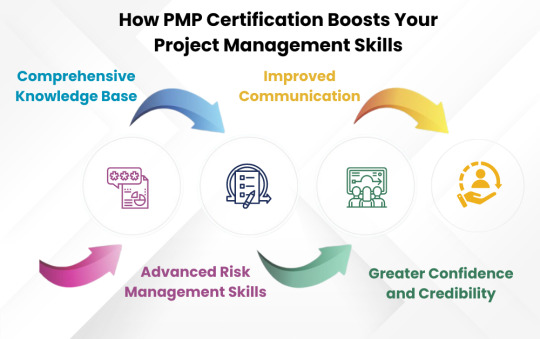
1. Comprehensive Knowledge Base
Broadened Understanding of Project Management Concepts
PMP certification requires a thorough understanding of the Project Management Body of Knowledge (PMBOK) guidelines. This comprehensive plan covers various aspects of project management, including integration, scope, time, cost, quality, HR, communications, risk, procurement, and stakeholder management.
Practical Application
Learning the PMP exam gives you useful insight into real-world concepts. This knowledge allows you to tackle projects with a rounded mind, ensuring all critical areas are properly addressed.
2. Enhanced Strategic Thinking
Alignment with Organizational Goals
PMP certification emphasizes the importance of aligning projects with organizational processes. This design focus ensures you understand how each project contributes to broader business objectives, leading to impactful and relevant project outcomes.
Improved Decision-Making
With a thoughtful approach, professionals with PMP certification are better equipped to make informed decisions. They can evaluate project options, consider long-term implications, and choose actions that best support organizational goals.
3. Advanced Risk Management Skills
Proactive Risk Identification
The PMP certification emphasizes the importance of communication in project management. Certified project managers learn to communicate clearly and effectively with stakeholders at all levels, ensuring that project goals, progress, and issues are understood and addressed promptly.
Effective Risk Mitigation Strategies
PMP training provides the tools and techniques to develop and implement effective risk reduction strategies. This capability reduces the potential for project bottlenecks and increases overall project success.
4. Improved Communication and Leadership
Clear and Effective Communication
PMP certification emphasizes the importance of communication in project management. Certified project managers learn to communicate clearly and effectively with stakeholders at all levels, ensuring that project objectives, progress, and issues are quickly understood and addressed.
Leadership and Team Management
PMP-certified employees are trained in leadership styles that enhance collaboration and motivation across work units. These skills are critical for teams to guide teams through challenges and ensure successful project delivery.
5. Mastery of Project Management Tools and Techniques
Utilization of PM Tools
The PMP certification covers a wide range of project management tools and techniques, from Gantt charts and critical process analysis to earned value management (EVM) and agile methodologies mastering these tools empowers you to efficiently plan, execute, and manage projects.
Tailored Approach
With a full understanding of the various tools and techniques, PMP-certified professionals can tailor their approach to the specific needs of each project, resulting in more effective and customized project management
Conclusion
The PMP certification is more than just a certificate; It’s a transformational journey that greatly enhances your management skills. Benefits range from broader knowledge to strategic thinking to improved risk management and improved communication. By earning PMP certification, you not only validate your expertise but also equip you with the skills needed to excel in the dynamic and challenging field of project management If you want to advance your career or enhance your role results are improved, PMP certification is a powerful tool for professional development.
0 notes
Text
The Role of Mentorship in Earning PDUs: A Win-Win for Professional Development
Earning Professional Development Units (PDUs) is essential to maintaining your PMP (Project Management Professional) certification. While there are many ways to collect PDUs, counseling stands out as a beneficial option. Not only does it help you meet your certification requirements, but it promotes professional development and strengthens the project management team. This blog explores various aspects of mentoring PDU access and how it can be a win-win situation for mentors and mentees.
Understanding PDUs and the PMI Talent Triangle
Before diving into the consulting role, it is important to understand the framework within which PDUs operate. The Project Management Institute (PMI) requires PMP holders to earn 60 PDUs every three years to maintain their certification. These PDUs are broken down into three main areas defined by the PMI Talent Triangle:
Technical Project Management
Leadership
Strategic and Business Management
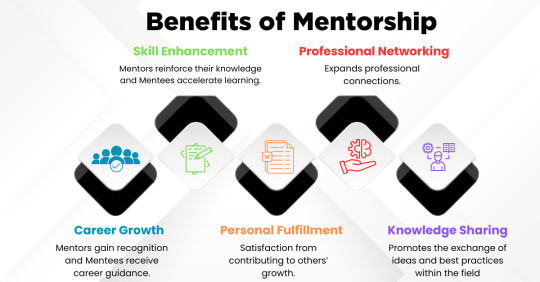
How Mentorship Earns You PDUs
Mentoring can be rewarding for everyone with experienced managers teaching less experienced colleagues. PMI recognizes the value of mentoring and can access PMI PDUs through formal and informal mentoring relationships. Here's how it works:
1. Serving as a Mentor:
Plan: Establish appropriate mentoring relationships, within your organization or through a professional association.
Role: Provide advice, share knowledge, and help guide mentors through career paths.
Obtaining PDUs: Record your consulting hours under the Leadership section in PMI’s Continuing Certification Requirements System (CCRS).
2. Being a Mentee:
Plan: Find a mentor who can help you grow professionally.
Activities: Conduct learning and development activities with your mentor.
Earning PDUs: Reflect and write about your learning experiences, which can also be listed under the Leadership section.
Benefits of Mentorship for Earning PDUs
Mentoring offers more benefits than just receiving PDUs:
1. Skill Enhancement:
Mentor: Coaching and mentoring others helps you strengthen your skills and leadership skills.
For Mentees: Direct access to experienced professionals accelerates learning and skill development.
2. Professional Networking:
For Both: Mentoring expands your professional network and opens doors to new opportunities and collaboration.
3. Career Growth:
For Mentors: Demonstrating leadership through mentoring can lead to career advancement and acceptance within your organization.
For mentees: Finding mentors can provide valuable career guidance and support.
4. Personal Fulfillment:
For both: Helping someone else’s career journey is so rewarding.
Conclusion
Mentoring is a powerful way to earn PDU and enhance professional and community development. Whether you are an experienced manager or just starting, getting involved in consulting can be very rewarding. By sharing knowledge, mentoring, and mutually supporting each other’s career journeys, mentors and mentees can succeed in their professional development So, take the initiative to mentor or advise, and see how your PMPs grow as they meet their renewal needs.
0 notes
Text
Understanding PgMP Certification: A Gateway to Advanced Program Management Excellence
Introduction
In today’s dynamic and complex business environment, organizations recognize the need for effective process management to achieve strategic goals. The Program Management Professional (PgMP) certification by the Project Management Institute (PMI) stands out as the prestigious certification for program managers worldwide This certification is designed to enable a professional to manage multiple overlapping projects systematically.
Understanding Program Management
Before diving into the specifics of PgMP certification, it’s important to understand what program management certification entails. Unlike project management, which focuses on accomplishing individual tasks, program management is the coordinated management of a group of related tasks to achieve a strategic objective Functions typically overlap and can encompass projects, subprograms, and other projects that combine to deliver value-added outcomes.
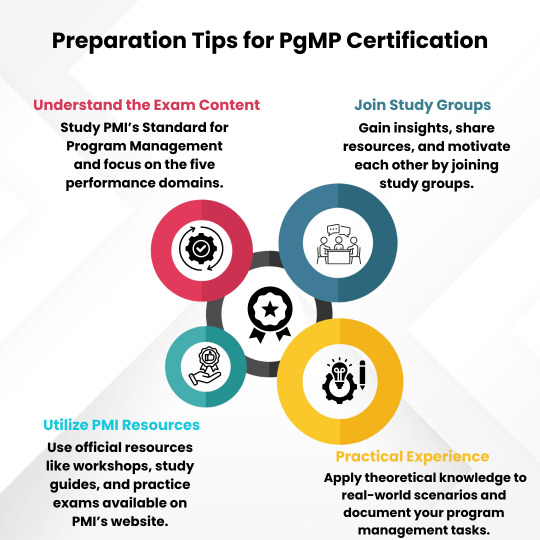
The PgMP Certification: An Overview
The PgMP certification is for experienced professionals managing complex projects to achieve strategic and programmatic results. Here is a breakdown of what PgMP certification entails.
1. Eligibility Requirements:
Educational Background and Experience:
Those with a secondary degree (high school diploma, associate degree, or worldwide equivalent) need a minimum of four years (6,000 hours) of management experience and seven years (10,500 hours). ) Experience in program management.
For those with a four-year degree (bachelor's degree or worldwide equivalent), a minimum of four years (6,000 hours) of project management experience and four years (6,000 hours) of project management experience.
2. Application Process:
Application Submission:
Candidates should submit an application detailing their work and program management experience. PMI reviews this application to ensure the candidate meets the required qualifications.
Panel Review:
Once an application is approved, it is reviewed by a team of PgMP-certified professionals. This assessment examines the candidate’s professional experience and skills in program management.
3. The Exam:
Format:
The PgMP exam consists of 170 multiple-choice questions, with a time limit of four hours.
Content:
Exam content is based on PMI's standards for process management and covers five performance areas: strategic management, program lifecycle, benefits management, stakeholder management, and governance.
Scoring:
To maintain the reliability and rigor of certification, the test is scored using psychoanalysis to ensure each candidate’s abilities are properly assessed.
Preparing for the PgMP Certification
The key to success in achieving PgMP certification is preparation. Here are some tips to get you started:
1. Understand the Exam Content:
Familiarize yourself with PMI’s Standard for Program Management and focus on the five performance areas identified in the exam specifications.
2. Join Study Groups:
Participating in study groups or seminars can provide valuable insight, shared experiences, and support from fellow PgMP competitors.
3. Utilize PMI Resources:
PMI offers a variety of resources, including workshops, study guides and practice tests, to help you better prepare.
4. Practical Experience:
Use your real-world process management experience to understand and apply the theoretical concepts discussed in the exam.
Conclusion
PgMP certification is a significant achievement for program management professionals, symbolizing the knowledge, dedication, and approach to managing complex projects and programs If you are validating your knowledge and skills, this certification can open doors for improved business opportunities to enable you to deliver impactful results to your internal team. If you’re ready to take your program management career to the next level, the PgMP certification can unlock your full potential.
#PgMPCertification#ProgramManagement#ExamPreparation#ProjectManagement#PMI#StudyTips#CareerAdvancement#ProfessionalCertification
0 notes
Text
Introduction to PMP Certification
Introduction
The Project Management Professional (PMP) certification is one of the most prestigious and sought-after certifications in the project management industry. Administered by the Project Management Institute (PMI), PMP certification attests to a project manager’s ability to effectively lead and direct projects. In this blog, we explore what PMP certification entails, its benefits, and why it may be the right step for your career in project management.
What is PMP Certification?
PMP certification is an internationally recognized certification of a professional’s knowledge and expertise in project management. The certification is designed for experienced project managers who manage all aspects of project delivery, and lead and guide multidisciplinary teams to prevent planning, budgeting, and resource development.
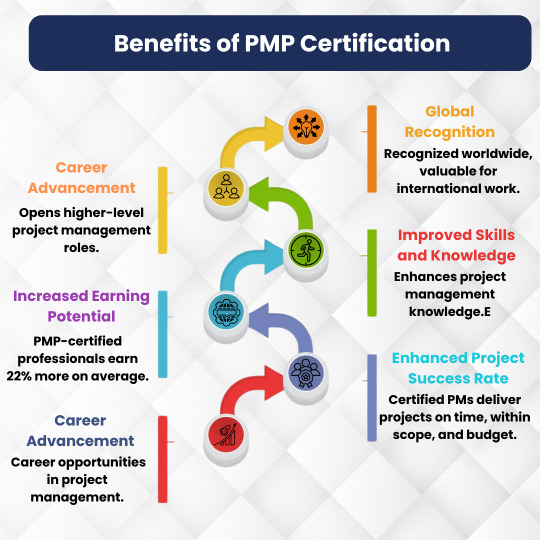
Eligibility Requirements
To qualify for PMP certification, candidates must meet certain education and work experience requirements:
1. Educational Background:
A four-year degree (bachelor's degree (bachelor's degree or worldwide equivalent) and a minimum of three years of management experience, including 4,500 hours of business leadership and mentoring and 35 hours of management education.
Or high school degree or associate degree (or world-class equivalent) with a minimum of five years of management experience, with 7,500 hours of business leadership and guidance and 35 hours of management instruction.
2. Professional Experience:
The experience must be non-overlapping, and candidates must accumulate the required hours in project management activities in five process categories: initiation, planning, implementation, monitoring and control, and completion.
The PMP Exam
The PMP exam is a rigorous test that assesses the candidate’s knowledge and skills in project management. The exam consists of 180 questions, which must be completed in 230 minutes. Questions are a mixture of multiple choice, multiple answers, matching, hot spots, and limited sorting.
The exam content is divided into three domains:
People (42% of the exam)
Focusing on the skills and activities associated with effectively leading a project team.
Process (50% of the exam)
Covering the technical aspects of managing a project.
Business Environment (8% of the exam)
Emphasizing the connection between projects and organizational strategy.
Benefits of PMP Certification
1. Career Advancement
PMP certification is highly regarded by employers and can greatly enhance your career prospects. Opens up opportunities for higher management roles and can increase responsibility and leadership positions.
2. Increased Earning Potential
Certified managers generally command higher salaries than their non-certified counterparts. According to PMI’s salary analysis, employees with PMP certification earn an average of 22% more than non-certified employees.
3. Global Recognition
The PMP certification is recognized worldwide, making it a valuable credential for managers seeking to work across countries or international teams This shows that you have a set of recognized project management skills and competencies accepted worldwide.
4. Improved Skills and Knowledge
The process of preparing for the PMP exam enhances your project management skills and knowledge. The advanced courses and training associated with obtaining certification ensure that you are well-versed in best practices and aware of the latest trends and techniques in project management.
5. Networking Opportunities
Becoming certified as a PMP gives you access to PMI’s extensive professional network. You can join local PMI chapters, attend events, and participate in seminars, all of which provide valuable opportunities for networking, learning, and professional development.
Conclusion
The PMP certification course is a powerful tool for managers looking to grow their business, increase their bottom line, and gain global recognition. By meeting the eligibility requirements, diligently preparing for the exam, and committing to continuous professional development, you can earn this prestigious certification and take charge of your business the project has reached new heights.
#PMPCertification#ProjectManagement#CareerAdvancement#HigherEarnings#GlobalRecognition#ImprovedSkills
0 notes
Text
Introduction to PRINCE2 Certification: A Comprehensive Guide
Introduction
Having the right certification in the dynamic field of project management can greatly enhance your career prospects. The most recognized and respected certification in this field is PRINCE2. This comprehensive guide aims to familiarize you with PRINCE2 certification, its benefits, and how to obtain it.
What is PRINCE2?
PRINCE2 (Projects IN Controlled Environments) is a structured project management approach that emphasizes planning and control throughout the project lifecycle. Developed by the UK Government and now widely recognized worldwide, PRINCE2 provides a robust, flexible system suitable for businesses of any size and complexity.
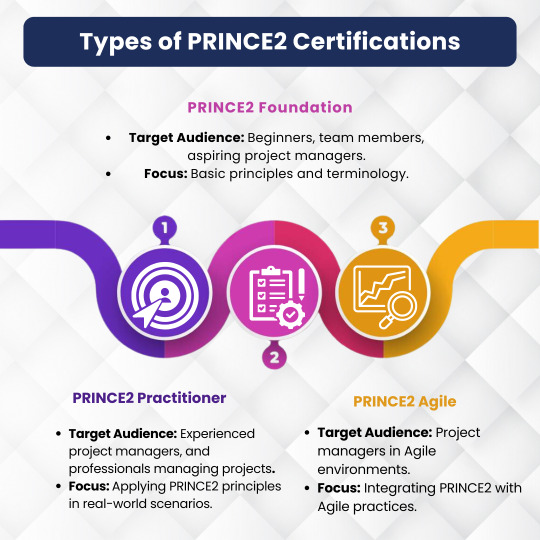
Types of PRINCE2 Certifications
PRINCE2 offers a wide range of certifications to meet different business requirements:
1. PRINCE2 Foundation
The PRINCE2 Foundation certification is designed for beginners in project management. It provides a solid understanding of the basic principles and terminology of the PRINCE2 methodology. This certificate is good for:
1. PRINCE2 Foundation
The PRINCE2 Foundation certification is designed for beginners in project management. It provides a solid understanding of the basic principles and terminology of the PRINCE2 methodology. This certificate is good for:
Aspiring project manager
Team members involved in the delivery of the project
Individuals seeking a career in project management
2. PRINCE2 Practitioner
The PRINCE2 Practitioner certification is based on knowledge gained at the Foundation level. Focuses on applying PRINCE2 principles to real-world business situations. This certificate is valid for:
Aiming to implement PRINCE2 in their organizations
Experienced managers
Administrative Staff
3. PRINCE2 Agile
PRINCE2 Agile combines PRINCE2 and Agile methodologies, enabling flexibility and responsiveness while maintaining the PRINCE2 process. This certificate is good for:
Project managers working in Agile environments
For those who want to integrate Agile practices with PRINCE2
How to Get PRINCE2 Certified
1. Choose the Right Certification Level
Determine which PRINCE2 certification level best suits your current experience and career goals. If you are new to project management, start with the PRINCE2 Foundation. If you have experience, consider Practitioner or Agile certification.
2. Prepare for the Exam
Preparation is the key to passing the PRINCE2 exam. Use different materials, e.g.
1. Official PRINCE2 Manual: The Official Guide provides a comprehensive overview of the PRINCE2 methodology.
2. Training courses: Enroll in accredited PRINCE2 training courses, both online and in person.
3. Practice tests: Conduct practice tests to familiarize yourself with the structure and type of questions.
3. Register for the Exam
Register for your chosen PRINCE2 exam through a recognized testing agency. Make sure you meet all prerequisites before applying.
4. Take the Exam
On the test day, ensure you are well-rested and focused. Follow exam instructions carefully and manage your time.
5. Maintain Your Certification
PRINCE2 certifications require periodic renewal. Stay with the latest PRINCE2 practices and continue professional development to maintain your certification.
5. Maintain Your Certification
PRINCE2 certifications require periodic renewal. Stay with the latest PRINCE2 practices and continue your professional development to maintain your certification.
Conclusion
The PRINCE2 certification course is a valuable asset for any project management professional. Not only does it enhance your skills and knowledge, but it also enhance your career prospects. Whether you’re just getting started in project management or want to advance your career, PRINCE2 offers a structured and efficient way to manage projects efficiently. Start your PRINCE2 journey today and take your project management skills to the next level.
#PRINCE2#ProjectManagement#Certification#CareerGrowth#PRINCE2Foundation#PRINCE2Practitioner#PRINCE2Agile
0 notes
Text
Free or Low-Cost PDU Opportunities for PMP Renewal
Introduction
Updating your new Project Management Professional (PMP) certification is essential to maintaining your credentials and industry practices. However, assembling the required Professional Development Units (PDUs) does not have to be an expensive undertaking. This blog will explore free or low-cost opportunities to earn a PDU, ensuring you can renew your certification without breaking the bank.
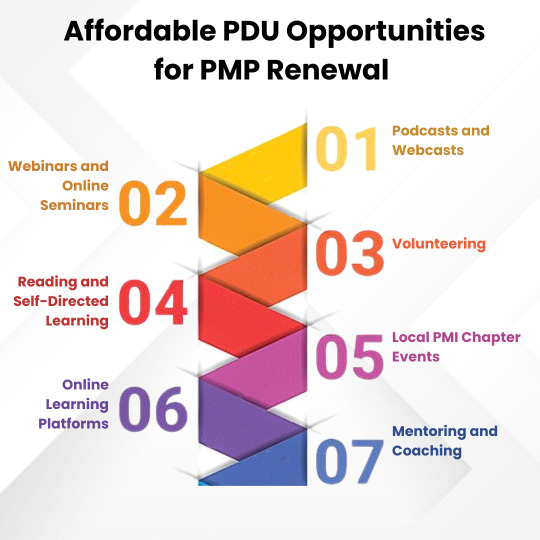
1. Webinars and Online Seminars
Many organizations, including PMI, offer free webinars and online seminars on project management topics. These webinars are an easy way to access PDU from the comfort of your home or office.
Recommended Resources:
1. PMI’s Webinar Library: PMI offers an extensive library of on-demand webinars that members can access. These webinars cover all aspects of the PMI talent triangle.
2. ProjectManagement.com: This site owned by PMI offers many free webinars that provide PDUs upon completion.
2. Podcasts and Webcasts
Listening to project management podcasts and webcasts is another cost-effective way to earn PDUs. Many of these are free and can be consumed on the go, during workouts, or at leisure.
Recommended Podcasts:
1. Project Management Podcast: Hosted by Cornelius Fichtner, this podcast covers project management topics and often offers free PDUs.
2. PMI's Projectified Podcast: This podcast discusses the latest trends and insights in project management.
3. Volunteering
You can earn a PDU by volunteering your time and expertise in project management organizations, including PMI chapters, and contributing to the community.
Volunteering Ideas:
4. Reading and Self-Directed Learning
Reading project management books, articles, whitepapers, and other relevant materials can also count towards PDUs. This form of self-directed learning allows you to study at your own pace and focus on areas of personal interest.
Suggested Reading Materials:
5. Participating in Local PMI Chapter Events
Attending local PMI chapter meetings and events can be an affordable way to earn PDUs. These events often feature guest speakers, workshops, and networking opportunities with fellow project management professionals.
Benefits of Local Chapter Events:
6. Online Learning Platforms
Many online learning platforms offer free or affordable courses that provide PDUs. These courses cover various aspects of project management and can be an excellent way to learn new skills and earn PDUs simultaneously.
Recommended Platforms:
Conclusion
Earning PDUs for PMP certification renewal doesn't have to be an expensive endeavor. By leveraging free and low-cost resources such as webinars, podcasts, volunteering, reading, local chapter events, and online learning platforms, you can meet your certification renewal requirements without straining your budget. These opportunities not only help you maintain your PMP certification but also ensure you stay updated with the latest trends and practices in project management.
By planning ahead and utilizing these resources, you can seamlessly integrate PDU earning activities into your professional development routine.
0 notes